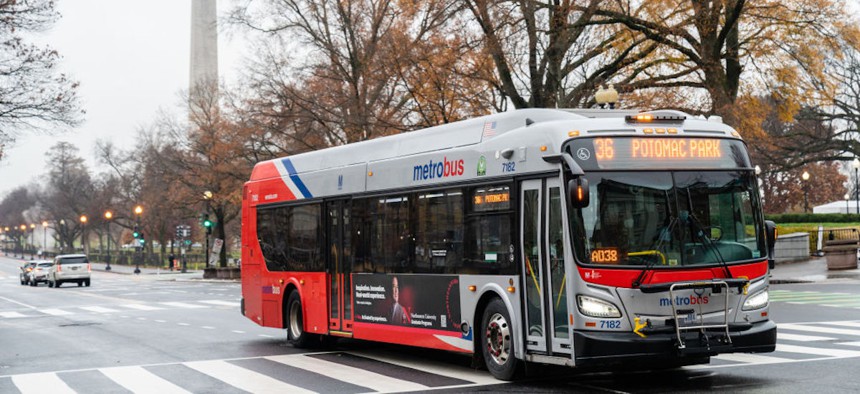Smart cameras ID bus lane violators

Eric Lee for The Washington Post via Getty Images
To increase bus speeds in Washington, D.C., Metrobuses will be outfitted with automated cameras to spot and help process infractions.
Some buses in Washington, D.C., will soon be outfitted with automated cameras to help catch drivers who park illegally in bus lanes.
A Washington Metropolitan Area Transit Authority (WMATA) board committee approved a plan that would initially mount two cameras each on 140 buses, with the option to expand to 600 buses over a 10-year period. The program is expected to launch in the fall after final board approval, with installation and testing to begin this summer.
The two cameras would be mounted inside a bus’s windshield. One, known as a context camera, uses GPS to video record the location of a bus lane violation, and another captures the violating vehicle’s license plate using Automated License Plate Reader technology. Buses would also be mounted with a GPS antenna to aid with location tracking.
The information is collected, processed, encrypted and transmitted to the District Department of Transportation to then issue a ticket to violators. The agency said it held a technology demonstration last year and reported that bus operators confirmed that neither camera interfered with their field of vision.
WMATA staff estimated that the camera technology will cost $4.6 million to procure and maintain over the first two years of the program, which has been dubbed “Clear Lanes.”
The program aims to improve bus speeds and increase reliability by cracking down on bus lane violators that impede bus traffic.
The average speed of Metrobuses in D.C. was 9.8 mph in 2022, with the average speed of the agency’s 15 highest ridership routes at 8.9 mph, transit authority staff reported. WMATA General Manager Randy Clarke said during the committee meeting that boosting those average speeds by just 7 miles per hour would be a “drastic” improvement.
Several other cities are using similar technology to improve bus lane enforcement, including New York City and San Francisco, with projects also under development in Los Angeles and Philadelphia. The program in New York City boosted bus speeds by between 7% and 31%, WMATA staff said.






